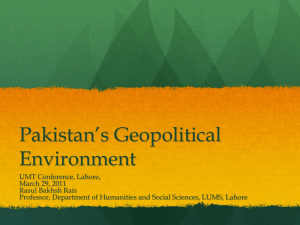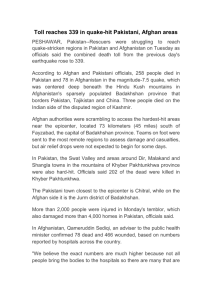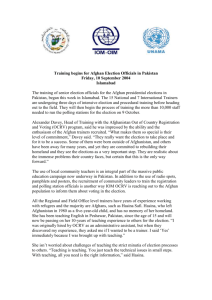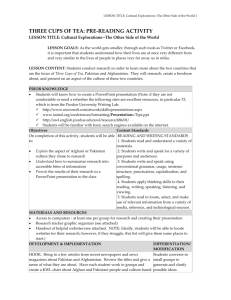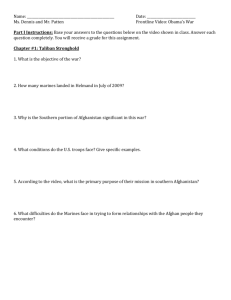Document 10465117
advertisement
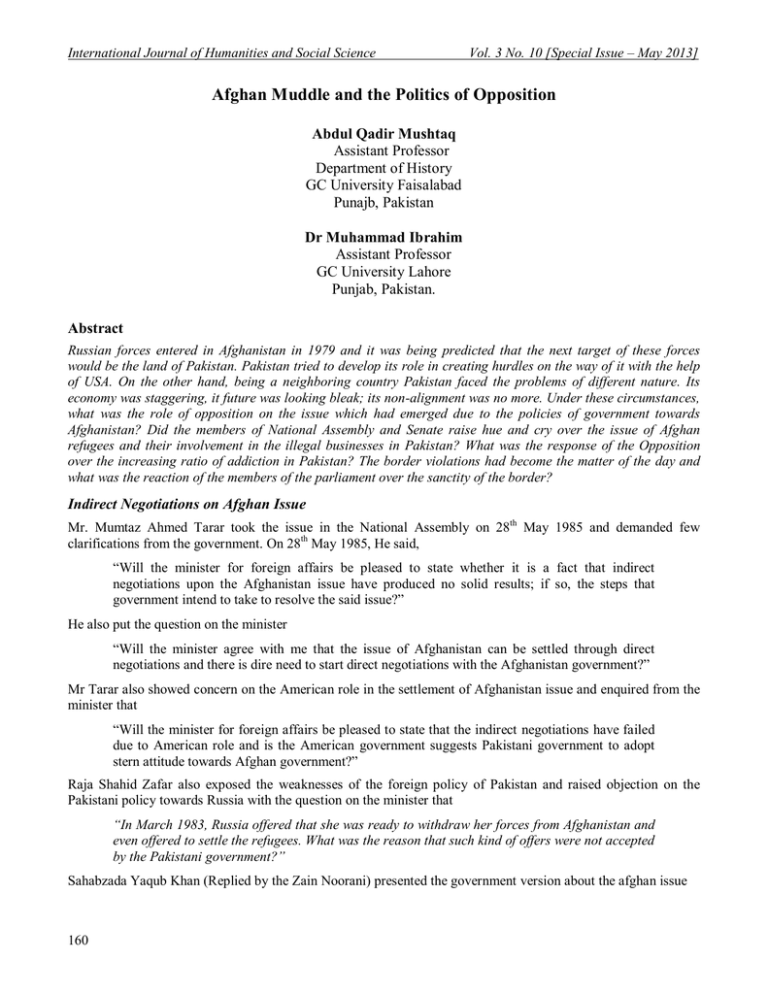
International Journal of Humanities and Social Science Vol. 3 No. 10 [Special Issue – May 2013] Afghan Muddle and the Politics of Opposition Abdul Qadir Mushtaq Assistant Professor Department of History GC University Faisalabad Punajb, Pakistan Dr Muhammad Ibrahim Assistant Professor GC University Lahore Punjab, Pakistan. Abstract Russian forces entered in Afghanistan in 1979 and it was being predicted that the next target of these forces would be the land of Pakistan. Pakistan tried to develop its role in creating hurdles on the way of it with the help of USA. On the other hand, being a neighboring country Pakistan faced the problems of different nature. Its economy was staggering, it future was looking bleak; its non-alignment was no more. Under these circumstances, what was the role of opposition on the issue which had emerged due to the policies of government towards Afghanistan? Did the members of National Assembly and Senate raise hue and cry over the issue of Afghan refugees and their involvement in the illegal businesses in Pakistan? What was the response of the Opposition over the increasing ratio of addiction in Pakistan? The border violations had become the matter of the day and what was the reaction of the members of the parliament over the sanctity of the border? Indirect Negotiations on Afghan Issue Mr. Mumtaz Ahmed Tarar took the issue in the National Assembly on 28th May 1985 and demanded few clarifications from the government. On 28th May 1985, He said, “Will the minister for foreign affairs be pleased to state whether it is a fact that indirect negotiations upon the Afghanistan issue have produced no solid results; if so, the steps that government intend to take to resolve the said issue?” He also put the question on the minister “Will the minister agree with me that the issue of Afghanistan can be settled through direct negotiations and there is dire need to start direct negotiations with the Afghanistan government?” Mr Tarar also showed concern on the American role in the settlement of Afghanistan issue and enquired from the minister that “Will the minister for foreign affairs be pleased to state that the indirect negotiations have failed due to American role and is the American government suggests Pakistani government to adopt stern attitude towards Afghan government?” Raja Shahid Zafar also exposed the weaknesses of the foreign policy of Pakistan and raised objection on the Pakistani policy towards Russia with the question on the minister that “In March 1983, Russia offered that she was ready to withdraw her forces from Afghanistan and even offered to settle the refugees. What was the reason that such kind of offers were not accepted by the Pakistani government?” Sahabzada Yaqub Khan (Replied by the Zain Noorani) presented the government version about the afghan issue 160 The Special Issue on Arts and Social Science © Center for Promoting Ideas, USA www.ijhssnet.com “The indirect talks have shown considerable progress. I would refer the Hon. Member’s attention to a recent interview of the secretary general special representative, Mr. Cordovez which was published in the Muslim on May 16 in which he clearly states that progress on a number of issues has been registered. This is not to minimize the importance of the outstanding issues and the difficulties in making further progress. But the problem is not, has the Hon. Member appears to suggest, the indirect form of negotiations. The problem is basically that a mutually acceptable negotiated solution that is based on the principles enunciated by the several UN resolutions on Afghanistan requires both sides to be sincere in their approach to the negotiations. So far the other side has been more interested in utilizing the forum of negotiations to progressively erode our principled position, to obtain recognition, for an illegitimate and unacceptable regime and to present the Afghan people and a world with a fait accompli brought about by the external use of force. It has shown little interest in negotiating a solution acceptable to the afghan people. The government of Pakistan believes that neither will a stable solution be found nor will oue own security be enhanced by legitimizing a situation brought about by force. We are, moreover, bound by the OIC resolution not to recognize the Kabul regime as long as foreign troops continue to stay in Afghanistan. The government will, however, continue to seek a negotiated political solution that is acceptable to the Afghan people in the conviction that there can be no military solution, and in the conviction that sooner or the later the other side will have to acknowledge that the people of Pakistan can not be bullied into adopting an unprincipled policy towards Afghanistan which would only undermine theor own long term security. This may take time, and may well involve certain burdens and sacrifices. But it is the only path that will lead to an acceptable and principled settlement of the problem of Afghanistan. Sir, I must emphatically contradict this assertion of the member. Pakistan-Afghanistan policy is its own and it is not dictated by any other foreign power. The main issue is not merely of holding direct negotiations or recognizing a government, but ligitimising it which under then present circumstances is not in the interest of Pakistan or the Afghans who have sought shelter in Pakistan. Sir, a number of ambassoders belonging to a number of other countries have been making statements which normally they aught not to make. It is not a question of pinpointing one ambassador only. If we go into the list, it would be others also who have gone beyond the scope of their duties. Air Violation by Afghanistan The Afghan Aircrafts committed violation of the Pakistan territory from 29th December 1979. Their yearwise breakdown is as tabulated below: SL No. Year 1 2 3 4 5 6 1980 1981 1982 1983 1984 1985 Total Number of Violations 179 98 60 89 88 101 (Official Record of the National Assembly of Pakistan) The members of the National Assembly felt insult over Air violation from Afghan side and they put questions on the foreign minister. Among them were Ch. Nisar Ali Khan, Shaikh Rasheed Ahmed, Raja Shahid Zafar and Balakh Sher Khan Mazari. On 28th May 1985, Ch. Nisar Ali Khan raised that 161 International Journal of Humanities and Social Science Vol. 3 No. 10 [Special Issue – May 2013] “Will the Foreign Minister be pleased to state: 1. The measures adopted against the frequent violation of air space by Afgahanistan; and 2. The steps taken to ensure that the said violations may not occure in future? Shaikh Rasheed Ahmed criticised the attacks and declared Objection of Government as “Psycholo Styled Agitation”. He said that it was a joke with the nation that “Psycholo Styled Agitation” was submitted in the foreign office but the government did not take it a serious matter. Raja Shahid Zafar demanded the clarification from the foreign minister that either the response of the violations would be only verbal or any practical step would taken.? Sahabzada Yaqub Khan (Replied by the Zain Noorani) presented the government version on the issue: “The government of Pakistan will defend every inch of Pakistani territory, let there never be the slightest doubt about that. At the same time we have so far restrained our reaction to the Kabal regime’s provocations along our border out of a desire to avoid a further escalation of military tension and to minimise the suffering of our people and of our Afghan brethren. Our restrained approach is proof positive of the sincerity with which we seek a peaceful negotiated solution to the problem of Afghanistan. We have, however, made it clear that our forbearance should not be mistaken for weakness nor is our patience without limit. We have both the capability and the determination to administer a fitting rebuff to such provocations if our protest to Kabul regime continue to go unheeded.” Mir Balakh sher Khan Mazari also demanded the foreign minister to update him about protest notes which had been handed over to the Afghan representatives after the violations of the territory of Pakistan. Afghan Refugees The number of registered Afghan Reguees upto 30-4-1985 was 26,00660. All these refugees were being kept in RTVs (Refugees Tentage Villages) scattered throughout the FATA, Balochistan and in the Isa Khel Tehsil of Mianwali District in the Punjab. The breakup was as under SL No. 1 2 3 Total Province NWFP Baluchistan Punjab Strength 19,84,828 5,12,779 1,03,053 26,00,660 These Afghan Refugees purchased the moveable and immoveable properties in the different cities of Pakistan. They even occupied over the government land. The members of the National Assembly showed concern over this kind of government Refugee Policy and they put questions on the minister with great suspicion. Among them were Haji Muhammad Younis Elahi, Rana Tanveer Hussain, Mian Muhammad Zaman, Syeda Abida Hussain. Abida Hussain showed suspicion on the purchase of the houses by the Afghan Refugees in the cities like Peshawar, Islamabad, Lahore, Karachi. She enquired that had all these purchase been done with the support of the Pakistani government? Mian Muhammad Zaman informed the house that it had come into his notice that Pakistani government was going to issue ID cards to the Afghan Refugees. Afghan Refugees Doing Business The Afghan refugees not only had settled in the various cities of Pakistan but also had engaged in the various businesses within Pakistan. They had engaged themselves in the construction, transport, wood, smuggling, etc. it was matter of deep concern for the people of Pakistan because the refugees had become burdon on the economy of Pakistan. Few members of the National Assembly like Rai Ahmed Nawaz, Dr Shar Afghan Niazi, raised objections on this issue and registered their protest to the concerned minister. 162 The Special Issue on Arts and Social Science © Center for Promoting Ideas, USA www.ijhssnet.com Syed Qasim Shah, Minister for Refugees, tried to eliminate their suspicion through arguments. He declared that it was their right to do any business for living but they could not start business at the vast level. Smuggling of Heroin With the arrival of Afghan Refugees, the heroin addiction rate increased in Pakistan. In different places like Rose and Jasmine Garden, the heroin was sold under the protection of the local administration. The members of the National Assembly took notice of such kind of governmental failures and demanded the treasurer benches that they should be informed about the addicted ratio and the smuggled heroin from Afghanistan. Shaikh Raheed Ahmed mentioned the British newspaper who had published an article accusing Pakistan and some departments of the government in smuggling heroin. He enquired that whether Government lodged protest or instituted a suit of damages against a British newpaper for publishing an article. The foreign minister could not satisfy the member on the said question. Mr Mumtaz Ahmed Tarar asked the Interior Minister to please state: (a) The number of persons addicted to heroin in the country in present: (b) Whether, it is fact that number of the said persons has increased to 25,000,00; if so, the steps taken or being taken to prevent the use of heroin? (c) Is it reality that with the arrival of Afghan Refugees, the use of heroin has increased? Qamar Zaman Shah Khagha also showed concern over the arrival of the Afghan Refugees in Pakistan. He enquired that the Afghan Trucks that were being used for transportation between Peshawar and Karachi brought the heroin. He showed doubts that either were it possible without the support of the local police? The few members of the National Assembly diverted the attention of the house through discussions on the issue of plants protection, seeds, fruits etc. But Mir Alakh Sher Khan Mazari showed indication about some of those pesticides which had been banned in Europe and America but were being used in Pakistan. Notes ______ 1 The National Assembly of Pakistan Debates, Official Report, Vol. 1. 1985. Ibid., 3 Record of the National Assembly. 4 National Assmebly of Pakistan Debates, official record, Vol. II, 1985. 2 163
